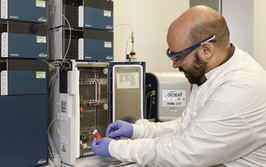The Patient Experience Trumps All
A patient-centric approach to clinical research is more than a “nice-to-have” attitude toward cell and gene therapy development. If companies want to make a difference in patient lives, they must prioritize it.
Cedric Picaud | | 3 min read | Opinion

With cell and gene therapies, the limited timelines for their delivery to patients forces companies to carefully consider international supply chains and logistics. Without stringent adherence to deadlines and carefully controlled supply chains, companies will lose important samples, resources, and find that patient trust is negatively impacted.
In particular, temperature-controlled supply chain logistics are key. Cell and gene therapies demand rigorous and precise temperature control to ensure therapies maintain their viability. From designing the best transportation route to selecting the correct packaging, every detail is critical to keeping product integrity high under all conditions. Temperature-controlled supply chain logistics companies, when designing the most suitable mode of transport to get life-saving samples from point A to B, should always keep in mind the reliability and the regularity of the service, the cost of transportation, and the safety and security of the goods that will be in transit.
For successful delivery, it is vital that the temperature-controlled logistics companies provide a full range of high-standard, qualified temperature-controlled packaging to handle various critical shipments for the precise conditions that will be encountered throughout the route. Additionally, it is important for logistics companies to ensure that maximum efficiency on volume/height and that the safety and global quality standards are met.
Traditionally, temperature-controlled logistics experts operate behind the scenes, with patients barely aware of the hard work that goes into their medicine’s journey. However, the COVID-19 pandemic and the impressive performance of vaccines have made people more aware of how critical and important a logistics provider’s mission is. As part of their response to the pandemic, specialists working in the temperature-controlled supply chain for the cell and gene therapies had to better understand patients’ pandemic perceptions and work with them directly to provide a solution to the healthcare community.
Global lockdowns meant that many patients were unable to travel to hospital sites for clinical trials due to travel and access restrictions, which led many sponsors to switch to a direct-to-patient model. And temperature-controlled logistics companies had a key role to play. As part of their response to this unique situation, they had to go further and dive deeper to better understand customers’ perceptions of the impact of the pandemic and work with them to provide those options while ensuring the patients were always at the center of everything. To do this, they had to change their business continuity plan and adapt it to the pandemic situation, including shift rotation and reinforcement of backups to consider their staff shortages; creation of backups of alternative routes and alternative airlines to maintain the same transit time and service level agreement; creation of backups of alternative agents/partners to fill any failures in their fleet and maintain the reliability, and overall performance through adaptations of operational processes.
The direct-to-patient model that has now been adopted for many clinical trials has many advantages, but cannot be seen as a universal solution. Direct-to-patient projects are complex and require more collaboration and planning compared with traditional clinical trials. They are not suitable for every clinical project, but they certainly have worked well to solve some of the challenges caused by global health crises. Many lessons have been learned that will benefit future clinical trials. And I feel that the pandemic has presented an opportunity for logistics specialists - usually seen as just a middleman - to showcase how important their work is and how they can support a patient-centric approach.
Chief Executive Officer at CRYOPDP is a Cryoport company



















